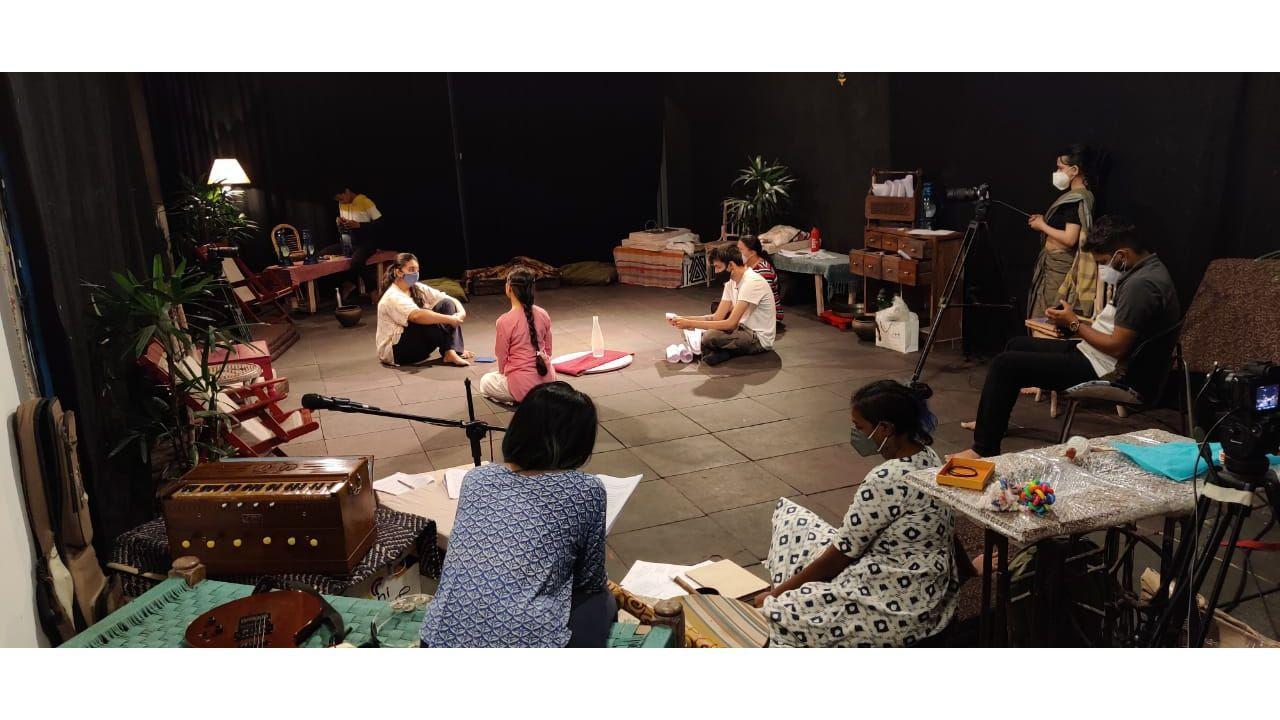‘Unshared Childhoods’ is a multi-sensorial piece designed and conceptualised by Tanvi Shah, who wanted to create a piece around empathy. It is done through unsent letters received from across the world, which are read by people in the audience

The 'Unshared Chidhoods' team during rehearsal
An audience-led experiment in empathy, disguised as a play. Sounds interesting, right? With all safety protocols in place (we’re in the midst of the second Covid-19 wave in Mumbai after all), Harkat Studios in Andheri is set to host this unique show on Sunday, March 28. Titled ‘Unshared Childhoods’, the show will be simultaneously performed at and live-streamed from a new and bigger studio space.
ADVERTISEMENT
Conceptualised and designed by Mumbai-based director-writer Tanvi Shah, ‘Unshared Childhoods’ is not a conventional theatre piece – it is interactive and entirely led by the audience.
Director Tanvi Shah
Inspired by a Gabriel García Márquez story
Shah says it all began in Glasgow, where she was studying for her Masters in 2018. “For a festival of original works, I wanted to design a dramatic experiment in empathy. I remember Gabriel García Márquez’s short story, ‘The Handsomest Drowned Man in the World’. I was also struck by the inherent dramatic potential of compound adjectives beginning with ‘un’ – unheard, unsaid, unwitnessed, unloved, unsung – because they highlight how all desire seems to come from a place of lack,” she says.
“As fodder for the piece, I offered a provocation – I requested people from across the world to send me letters that remained unwritten or unsent by them. Writing this letter could be an act of imagination, of catharsis, of redemption, or of remembering. Its intended reader could be alive or dead, known or unknown to the writers. That was the first phase of the project – collecting letters from across the world,” Shah says. “I won’t give away too much about the design, but it uses an old teenage game and the romanticised idea of notes in a bottle thrown into the sea. It brings audiences to step into the shoes of the writer and their intended recipient. It is a game of chance: who reads and how; it creates great anticipation and excitement.”
Who wrote the letters?
She says that she received a couple of dozen letters and from that she chose eight. “I had shared the concept with some writers’ groups on Facebook and got brilliant responses. Someone wrote an incredibly emotional letter to her estranged father. Some of these are actual unsent physical letters that were in people’s cupboards, or email drafts. Some people got my message and said they had always wanted to write to someone but hadn’t; they wrote letter for the project,” says the writer-director. According to her, even though these letters are not written by writers, yet they have so much dramatic potential; especially the things that weren’t said. Also, in the people, the people who read them aren’t actors. All these letters are anonymous.
Each letter has a theme
Shah says her team is in the process of “creating the scaffolding for the performance”. “There will be live musicians who will create the base, rhythm and the entire atmosphere of the piece. We have two musicians – Anusha Ramasubramoney and Pushkar Srivatsal – who will be lending original music to the piece. Each letter has a theme – from Marathi lullabies to rock-inspired tunes. Music is an integral part of the piece,” she says.
Movement artist Paridnya Kallyanpur, a Bharatnatyam dancer, will perform lyrical interpretations of each of these letters. “Everything is being done to make sure that the people who read out the letters feel supported; that they are not in the spotlight and they are not alone,” Shah says.
Sign-language support
This is a multi-sensorial performance piece and the team's attempt is to make it as homely as possible
They piece also includes an Indian sign language interpreter, Shabina Choudhary. She will be performing sign language for the non-hearing community who wish to watch the show. “And she isn’t just interpreting to make it accessible but it is an artistic choice to be part of the actual performance. She’s absolutely a part of the performance,” Shah says. “We are also working with Thotpot Studio who work with the 'godhadi' quilting community and our entire set is a patchwork set. This performance piece is multi-sensorial, so there will be food smells in the space – the attempt is to seem as homely as possible.”
Safety protocols
“We are sanitising the space as much as we can. We will be fumigating the space between two shows. All audience members will be asked to wear masks. There is an eclectic seating arrangement, with gaddas and sofas. People will not be asked to share seating; they will be all given their own space,” says Shah.
‘Unshared Childhoods’ will staged at Harkat Studios and live-streamed simultaneously on March 28, at 4.30 pm and 7.30 pm. Tickets are available at www.insider.in
 Subscribe today by clicking the link and stay updated with the latest news!" Click here!
Subscribe today by clicking the link and stay updated with the latest news!" Click here!






